A STAR PROJECT. EXAMPLE OF GOOD PRACTICES.
The project "Women as Spiritus Movens towards equality in the European citizenship", which concentrated on the current and vital needs of our students, has far exceeded our expectations.
It has been recognized in Spain as an example of perfect transition from Comenius to Erasmus+. Spanish National Agency chose this project as an Example of Good Practises, to be presented in a National Dissemination Event for Erasmus+ programme in Madrid (December 2016). Coordinator of the project and some students from Long Term Mobility shared their experience with schools aiming to take participation in Erasmus+ projects.
Additionally, it has been chosen by the Polish National Agency to be presented during the international eTwinning conference in Florence as a unique citizenship project using etwinning platform (September 2016).
The impact of this project has reach to such a tremendous level, that some of the partner schools have decided to apply it not only at an international level, but as a local one. This was the case of the Spanish school. They decided to develop all activities from Erasmus + with all students and teachers at the school during two weeks in 2016. The national version of this Erasmus+project, was named "Women´s World". It has had such an outstanding importance in the community that social media covered the news at all levels: press, radio, T.V., online newspapers,...
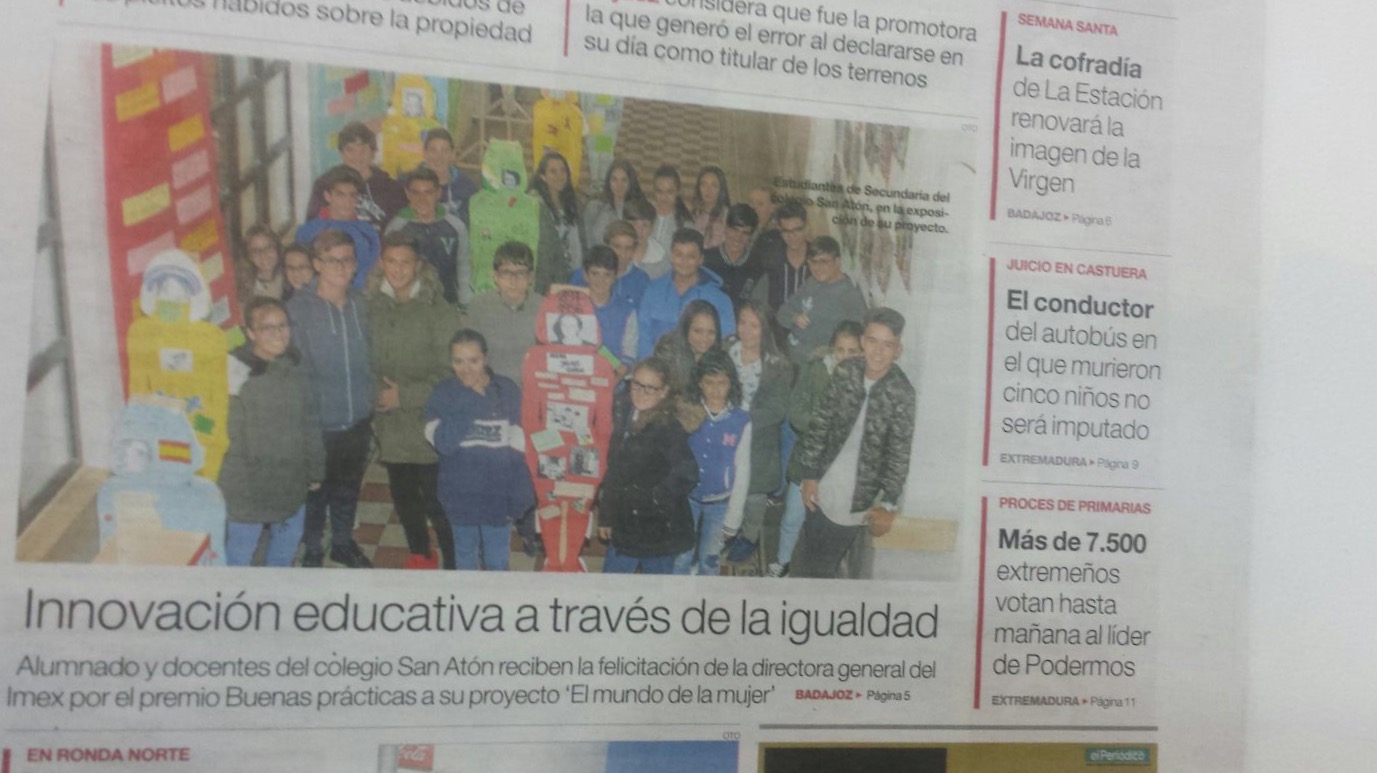
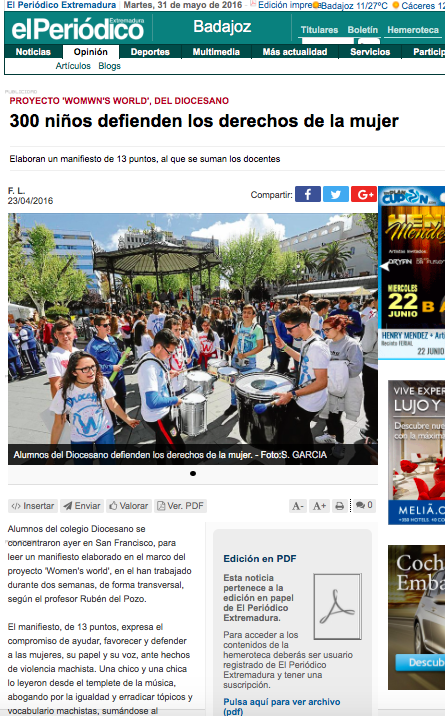
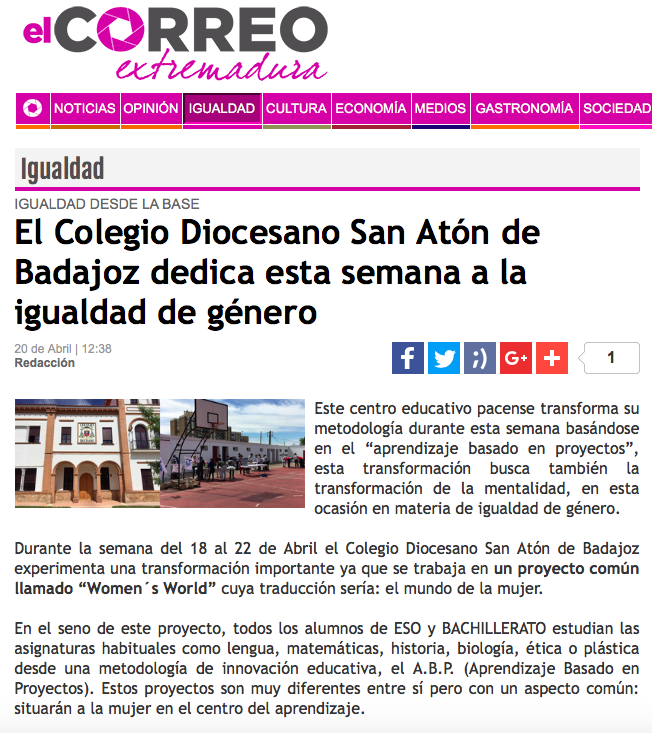
It has been recognized by the Regional Goverment from Extremadura with the highest and most important prize to the Good Practices in Education. The head of the Women Institution in Extremadura came to congratulate personally to the school for such an awesome project and the great consecuences that it has in the students, their families and all society in general.
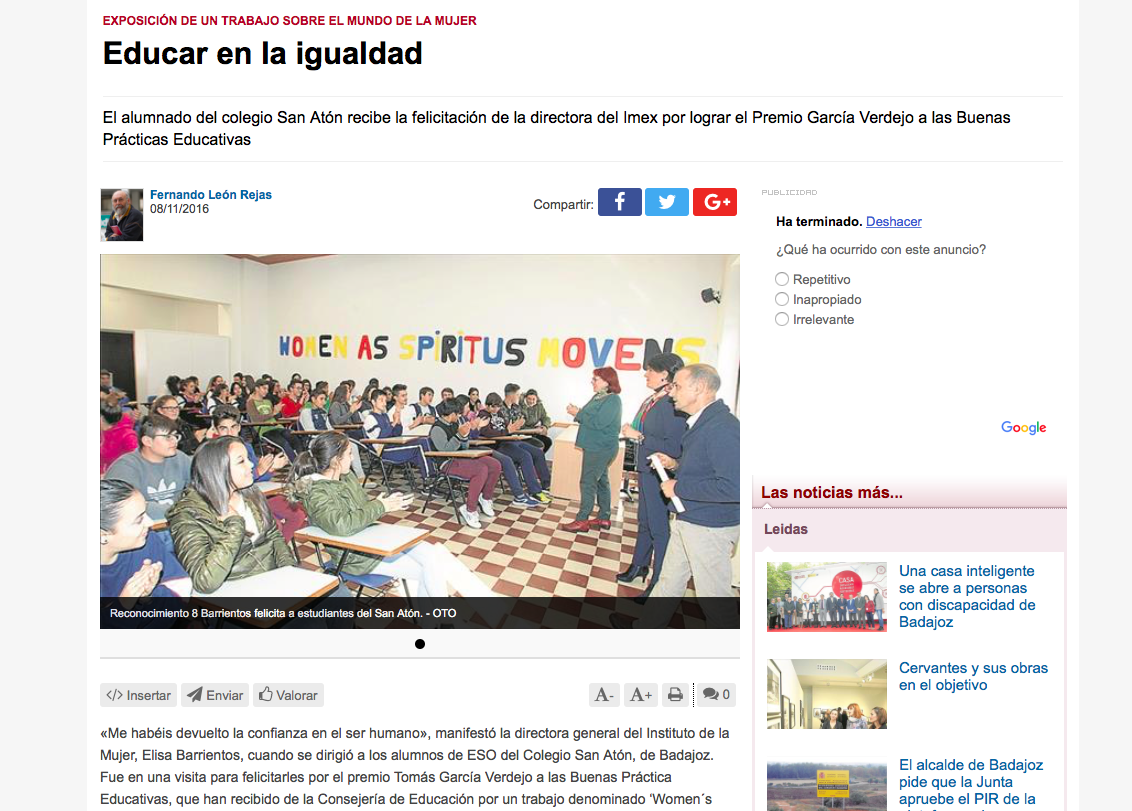
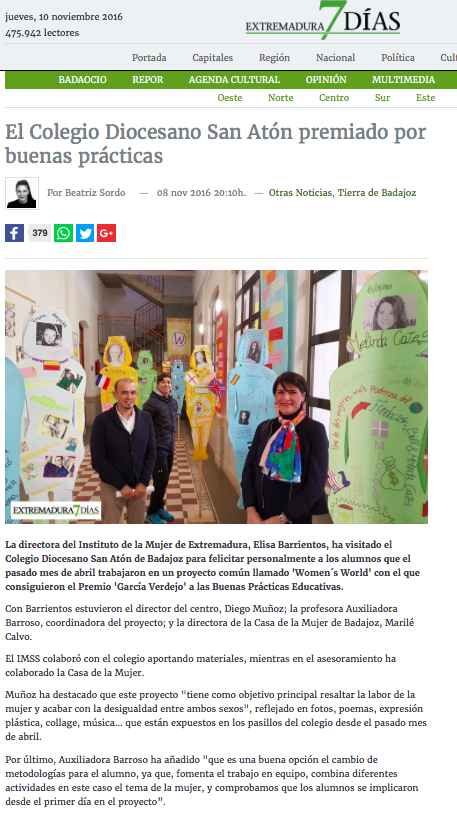
Polish National Agency choose our project to be presented as an example of good practise in the international conference held in Florence, in September 2016. The aim of this conference was to appreciate those projects using etwinning towards equality in Europe. Miss Barbara Walasik, coordinator of our Polish school partner gave a lecture about how our project has used twinspace as the main communitation, organization and dissemination platform.

The main working platform for our project was twinspace in eTwinning, where we uploaded, shared and disseminated all our products.
Wacht some videos of the presentation from our project as role model for other schools applying for an Erasmus+ project. It was during the Regional Conference about Erasmus+ in Extremadura (Spain) with the Head of the Education Seccion from Spanish National Agency, Andrés Ajo.
Teacher´s experience video: Speech and presentation from Antonio Cumplido, coordinator of the project.
Student´s experience video: Speech from Pablo Muñoz, student from Long Term Mobility.
Headmaster´s experience video: Speech from Diego Muñoz, Headmaster of Colegio Diocesano San Atón.
This was the presentation: https://prezi.com/8oisoj6051x3/edit/#23_30863873
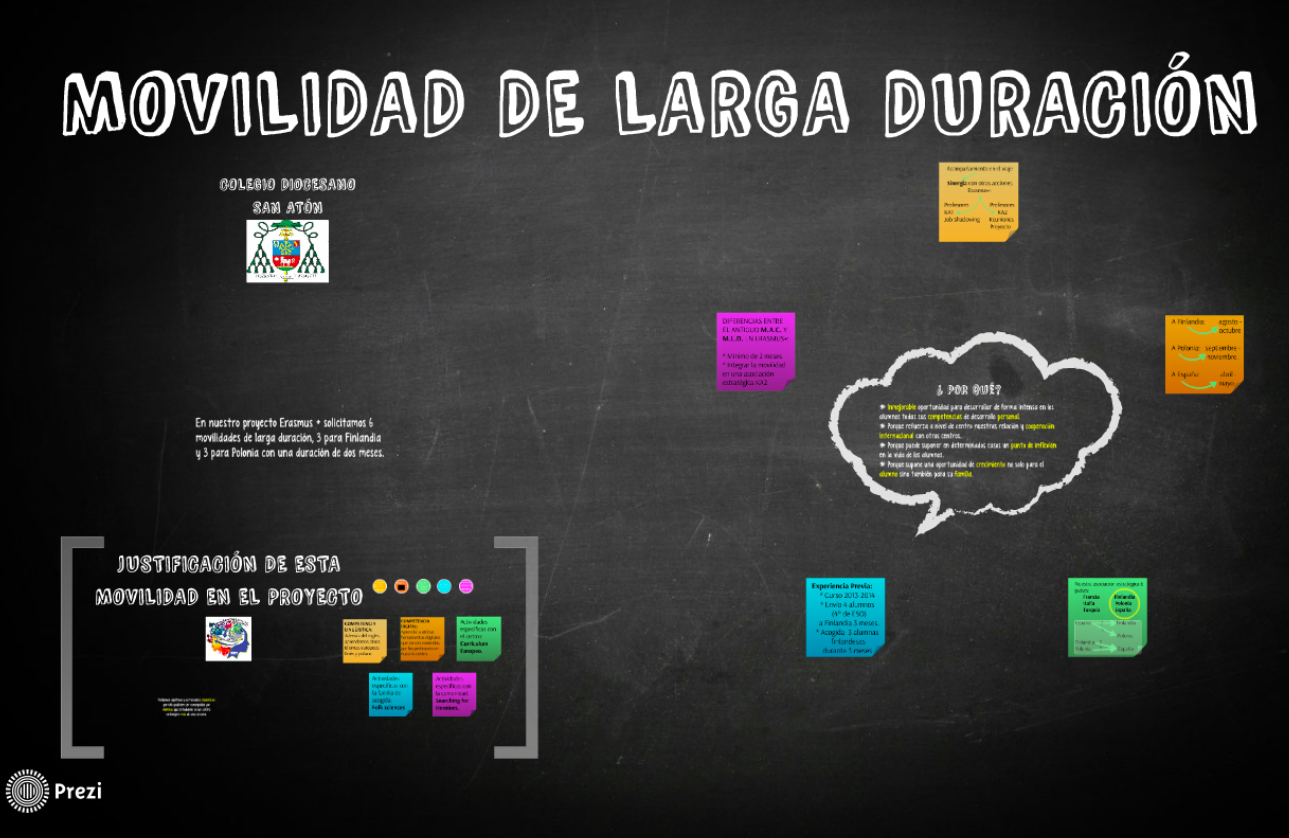
For that reason, our project was chosen by the Regional Goverment in Extremadura (Spain) to be presented as a good practise in the Regional Conference about etwinning in Mérida (October 2015), together with members of Spanish National Suport Sistem of etwinning. Here you have the prezi presentation: https://prezi.com/8oisoj6051x3/edit/#23_30863873
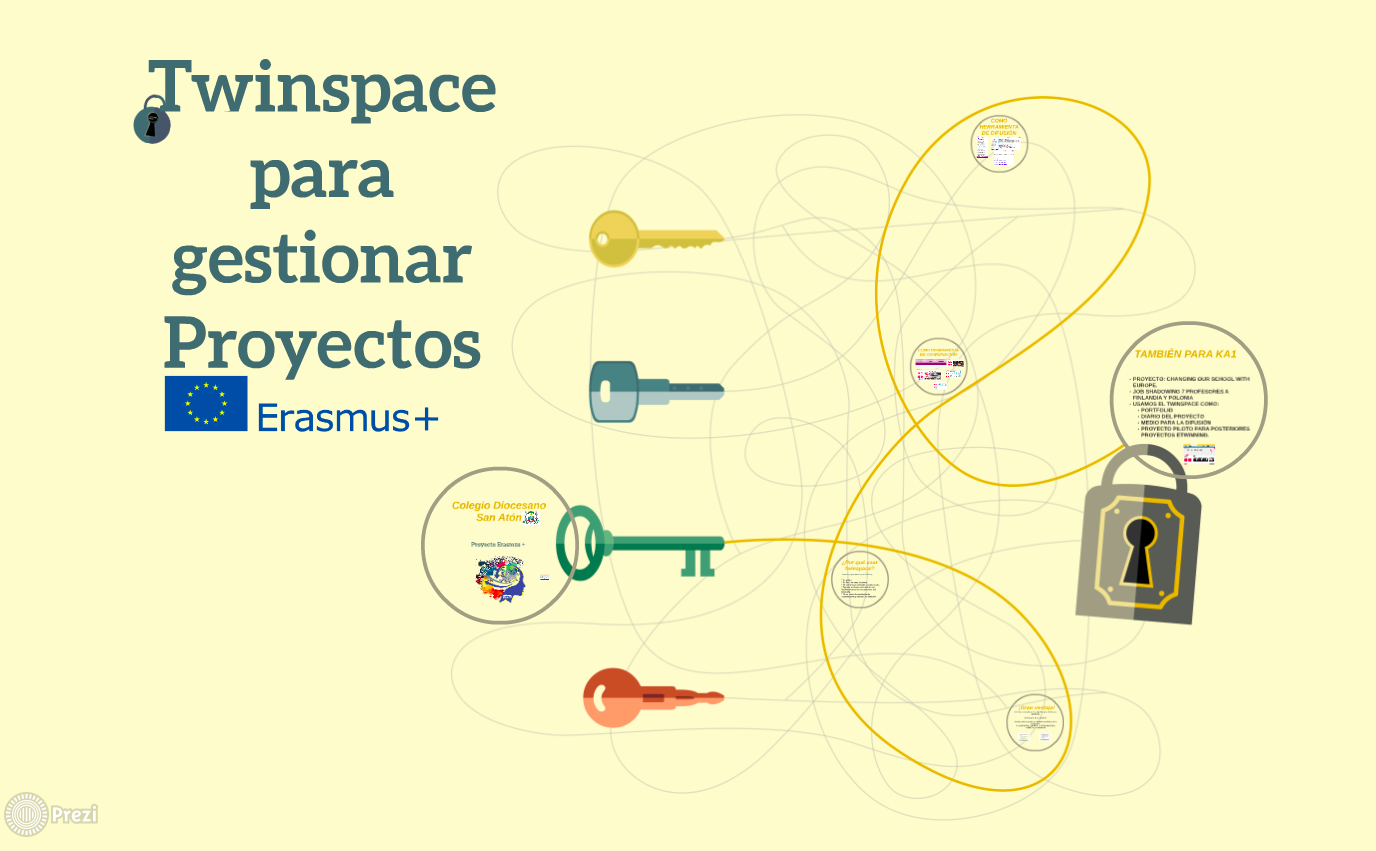
Since the very begginig, our project was called to be presented as an example of good practise. The 12th position on the list of approved projects in the 2014 call in Spain, made our project the first in the region of Extremadura and one of the best in Spain. We have been helping other schools to get enrolled in Erasmus + projects with some presentations in Mérida and Badajoz, organized by the regional goverment and the centers of teachers development.
Here you can see the presentations: http://prezi.com/p0sdm58v6u_y/?utm_campaign=share&utm_medium=copy&rc=ex0share
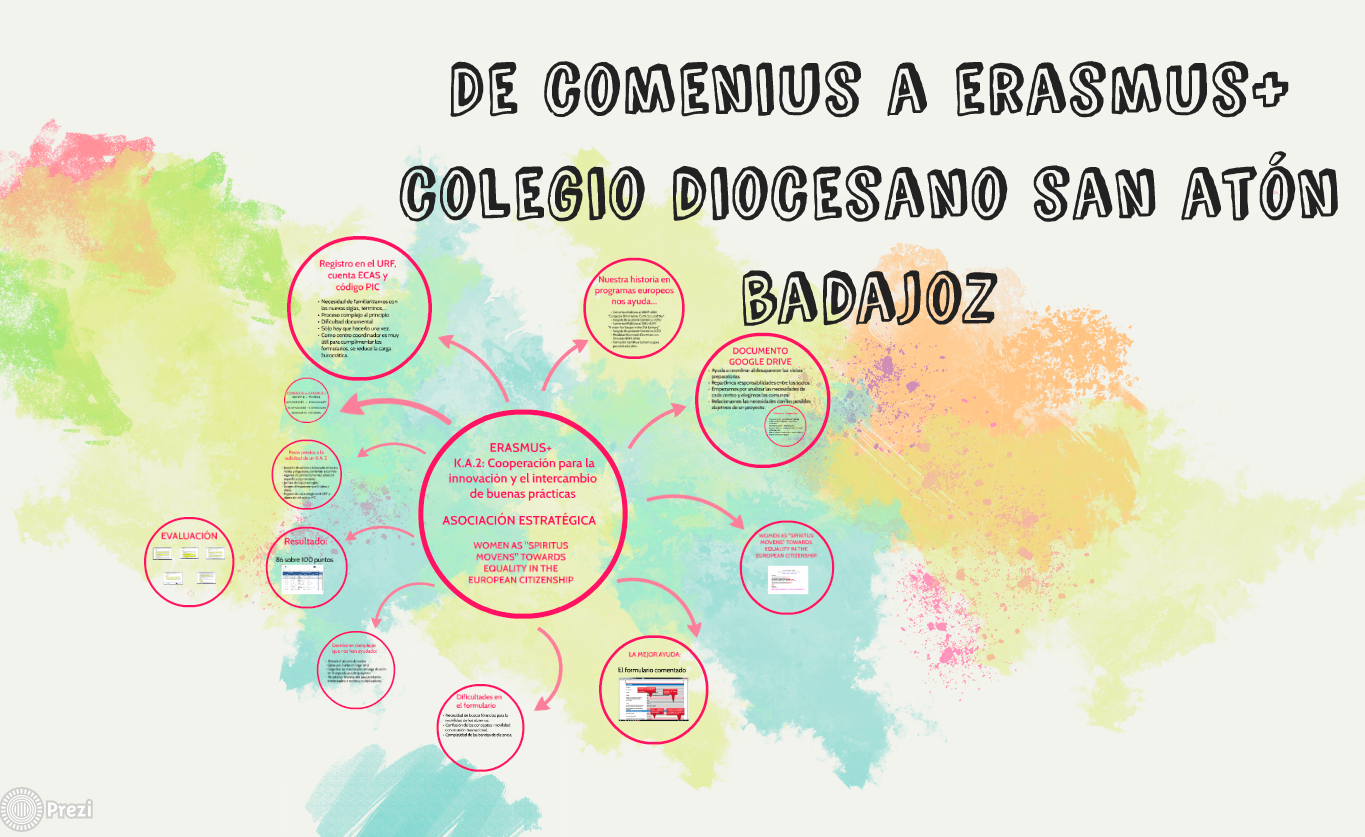
These are some more reasons why this project has proved to be a resounding success at all levels:
As the situation of women differs from country to country, all the schools involved agreed on the importance of working towards the equality in many fields: civil rights, salaries, decision-taking, participation in public life, early dropout from school and job opportunities. Gender violence was one of our concerns and we needed to make use of education and European experience to prevent any kind of discrimination and enhance mutual understanding between men and women.
We encouraged foreign language usage and the development of IT skills, not as the main purpose of the project but as a tool to achieve other goals. This project supported entrepreneurship among the young and adjustment to the current economic situation by combining education with practical solutions.
Our priority was students` responsibility for their learning process, e.g via their individual mobility. It was successfully proved in the long-term mobility exchange, a unique experience offered in this project, to open students´ minds and consequently change their lives.
With the constant demand for enhancing the quality of teachers’ work, we exchanged ideas and teaching experience and designed a manual of good practices, in the form of an e-book. Besides, teachers elaborated a Pedagogical Programme to be easily disseminated and used by every teacher, school, association, or other institutions in Europe working in the field of equality and citizenship.
This project also aimed at coping with the need of internationalization of our schools in order to meet future demands, the need to educate competent European citizens by improving all their basic competences and the need for improving our teaching/learning skills according to the strategies in education in the 21st century.
Although this plan had been prepared by teachers, students played a significant part in it. Moreover, they took an active part in planning, development and evaluation of the project, learning how to carry out surveys and interpret the obtained data in order to write different evaluation reports with the use of tables, percentages and graphics.
In this project we put special emphasis on the development of students´ and teachers’ digital skills through the use of new i-tools, such as applications for tablets and smartphones, e-books, online newspapers, digital open educational resources, etc. In fact, more tools than initially planned were explored and used (e.g issuu, padlet, kahoot, etc.).
The objectives were explained in such a way that they are measurable and quantifiable via indicators. To evaluate aims, tasks, project activities, project meetings and products/results, we developed the "Follow-up and Measurement Plan" in which quantitative and qualitative ways of evaluation were applied.
Open Educational Resources, such as the Manual of Good Practices and the Women as Spiritus Movens Pedagogical Programme, as well as other products (app, Q.R Codes, online newspaper, e-book, a documentary film, a DVD with a flashmob, glogsters, prezi presentations, scientific researches, business ideas, etc.) will always be available for free download through the links offered on Twinspace, Erasmus+ dissemination platform, website and blogs.
The project has been widely disseminated starting from the local level, through regional up to national and international levels: lectures on “Good Practices” in national training workshops and international conference, etwinning, website, newspapers, radio, TV, the internet, etc.
The key competences of the main participants of this project, students and teachers, improved significantly. Both students and teachers enhanced their digital skills and analytical abilities. They raised their awareness about the EU citizenship, women´s influence on European civilization development, healthy nutrition, social exclusion, limiting stigmatization of young people and acting as volunteers. They learnt to appreciate the role of their own and other cultures and women’s contribution to the development of Europe.